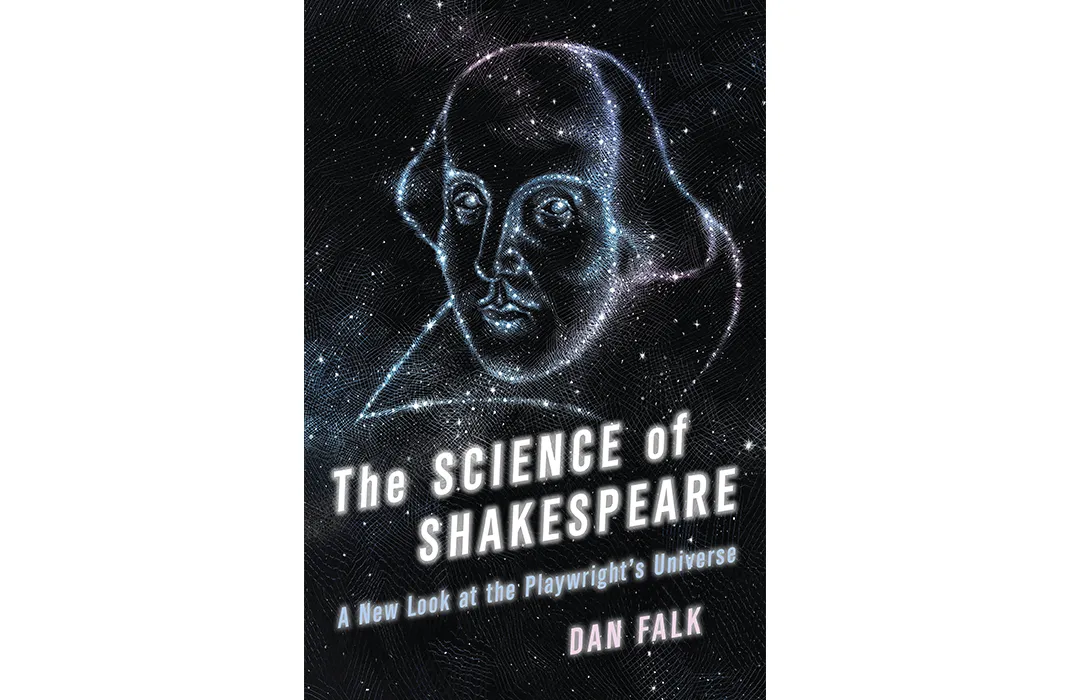Was Shakespeare Aware of the Scientific Discoveries of His Time?
For his new book, Dan Falk followed a group of scholars who argue, unlike most, that the playwright was up to speed with the latest astronomy
/https://tf-cmsv2-smithsonianmag-media.s3.amazonaws.com/filer/51/63/5163a5f2-b15b-461d-b9d9-c8b9324ce999/f4258.jpg)
You could read the line in Hamlet about shuffling off this “mortal coil” and think it has something to do with the helical structure of DNA, says Dan Falk. But, that would be crazy, right?
Perhaps equally wild, however, is this: Many Shakespearian scholars conclude that the playwright was not conscious of the Scientific Revolution that was happening around him.
In timing with the 450th anniversary of Shakespeare’s birth this month, Falk has released his new book, The Science of Shakespeare. In it, he argues that the Bard was mindful of the developments happening in astronomy during his day and, in fact, used them as fodder in his plays.
I recently had the chance to talk to Falk, a Shakespeare fan and amateur astronomer. He shared his ideas and those of a small sect of scholars who are rethinking the playwright’s grasp on science.
Shakespeare was born in 1564 and died in 1616. He wrote most of his works between 1589 and 1613. What was going on at this time scientifically?
Shakespeare lived and worked when some very interesting discoveries were happening. These are discoveries that we now think of as key developments in the Scientific Revolution. Of course, nobody called it the Scientific Revolution back then. That term wasn’t coined until maybe the 19th century. They didn’t even have the word science, at least not in the sense that we think of the term today. There was natural philosophy.
What was going on in science? We can remember that Copernicus published his groundbreaking book, On the Revolutions of the Heavenly Spheres. That was 1543—21 years before Shakespeare is born.
There is a supernova that lights up the night sky in 1572, observed by Tycho Brahe in Denmark but also observed in England. We call it the Tycho star. Thomas Digges in England publishes an almanac in support of the Copernican system in 1576. He is expanding on an almanac originally written by his father Leonard Digges but he includes a diagram that shows the stars extending outwards seemingly towards infinity. This is something Copernicus never talked about, but here is a suggestion that maybe the universe is infinite.
Gerardus Mercator, famous for the Mercator projection, publishes his atlas in 1595. This is also the age of exploration, so we have new ideas about just how large the world is. For example, how small is the tiny island of Britain compared to the vastness of the world?
You have people like William Gilbert writing his treatise on magnetism in 1600. Aside from the first supernova, there is the second supernova. The star that we think of as Kepler’s star exploded in 1604. He could not have missed that. There were eclipses of the Sun and Moon in the fall of 1605 that Shakespeare could very well have seen.
Francis Bacon writes his book, The Advancement of Learning, in 1605, a book that for the first time was laying out the rules for science and how science ought to be done. The telescope is invented in 1609 in Holland and Galileo gets his hands on one, starts looking at the night sky, makes all these now very famous discoveries and then publishes them in a little book called Sidereus Nuncius, the Starry Messenger, in the spring of 1610.
Even if there was nothing interesting to be said between the relationship between Shakespeare and these discoveries—and I don’t think that’s the case—I think the fact that he lived and worked while this was happening is still a great excuse to use whatever he did write as a probe or a side door to get into this remarkable period of history.
For the most part, scholars have thought that Shakespeare was largely unaware of the groundbreaking science of his day. What has been said? On what grounds do they make this conclusion?
Shakespeare doesn’t talk about the so-called “new philosophy,” or the new ideas of Copernicus and later Galileo. It is not mentioned overtly, like it is when you read John Donne or John Milton. John Donne has this poem, “An Anatomy of the World.” The line is “new philosophy calls all in doubt.” Milton is writing a half-century later, but still in Paradise Lost you have this very overt story about the differences between the two world systems and which is better.
When he does talk about astronomy, you have Julius Caesar comparing himself to the North Star. You have Romeo and Juliet analyzing the rising Sun. In King Lear, they talk about eclipses of the Sun and Moon. There are actually many references like that, but it is not immediately clear that they have anything to do with these developments in science, the new philosophy. So, you can just dismiss it as being fairly medieval or pre-Copernican.
There are several places where he’ll talk about the spheres, meaning the heavenly spheres or the crystalline spheres that go back to Aristotle and are presumed to hold up the stars and planets. If you leave it at that, it’s like, well, so this is all very poetic, but he clearly doesn’t seem to have been engaged in science.
Eventually, we come to see these spheres as fictitious. If Shakespeare keeps talking about the spheres, does that peg him as old school? Who knows, right?
In Hamlet, one of the characters says “Make thy two eyes, like stars, start from their spheres,” as in, I was so shocked at seeing the ghost that my eyes jumped out of my head, just like a star might be pushed out of its sphere. That alludes to the medieval cosmology, but that doesn’t mean that Shakespeare believed it. You see how tricky this is?
Plus, within one play, you might have a character who sees things one way and a character who sees things another way. Of course, you are left wondering, does either character represent Shakespeare?
You’ve found a small group of scholars who believe they’ve found ties in Shakespeare’s works to science. Peter Usher, an astronomer, for one, has an interesting interpretation of Hamlet.
Peter Usher has a very elaborate theory about Hamlet, in which the play is seen as an allegory about competing cosmological worldviews. There are actually three of them: the old Ptolemaic Earth-centered point of view, the new view of Copernicus and this kind of hybrid view put forth by Tycho Brahe.
Usher sees the characters in Hamlet as standing in for various astronomers or mathematicians. His starting point was the bad guy of the play, Claudius. Claudius is the uncle who has murdered Hamlet’s father, the old King Hamlet, and has married the queen and taken over the throne. So, Claudius happens to have the same name as Claudius Ptolemy, the ancient Greek mathematician and astronomer who we now associate most closely with the geo-centric Ptolemaic worldview.
Hamlet stands in for Thomas Digges and the new, correct Copernican worldview. Rosencrantz and Guildenstern stand in for Tycho Brahe. He finds this one-to-one correspondence between the characters in Hamlet and various astronomers and philosophers either from ancient times or who were active in Shakespeare’s day.
Usher and others, including scholars Scott Maisano and John Pitcher, also make an argument about the play, Cymbeline, that you find to be strong evidence of Shakespeare’s scientific knowledge. Can you explain?
Scholars generally say that Shakespeare had nothing at all to say about Galileo. I think that’s too hasty. The obvious place to turn is this remarkable scene in Act V of Cymbeline.
I’ll give you the brief version: The god Jupiter descends from the heavens. He actually comes down to Earth and the four ghosts of the protagonist’s dead relatives—mother, father and two brothers—appear. The main character is British, but he was pretending to be Roman, so British soldiers capture him thinking that he is an enemy combatant. They put him in jail where he falls into a kind of a trance. He is having this dream and these four ghosts dance around him.
Does this prove anything? No. But it is very, very suggestive. We’ve got Jupiter and four ghosts moving in a circle. More or less in the same year that Cymbeline was written, Galileo has just published this book, Sidereus Nuncius, describing Jupiter and these four previously unknown moons that move around Jupiter. Maybe this scene in Cymbeline is Shakespeare’s way of at least alluding to it. Cymbeline is a complicated play, but that scene is bizarre compared to Shakespeare’s other plays. It is just a very strange thing, and at least the Galileo allusion is a kind of possible explanation for it.
How interested was he in [Galileo’s work?]? I don’t know. Maybe it was just one of a dozen things that he thought were topical and noteworthy at that time. This is not someone who was just sort of unaware of the news of the day. This suggests that he at least had some interest in this fascinating book written by an Italian scholar 1,000 miles away. Maybe this was his tip of the hat to that discovery.
I think discoveries like this one provided Shakespeare fodder for his plays. I think he was at least aware of some of these developments and thought, okay, that’s cool. What can I do with this? He didn’t obsess over it the way that John Donne and John Milton did, but that doesn’t mean he ignored it either.
/https://tf-cmsv2-smithsonianmag-media.s3.amazonaws.com/accounts/headshot/megan.png)


/https://tf-cmsv2-smithsonianmag-media.s3.amazonaws.com/accounts/headshot/megan.png)